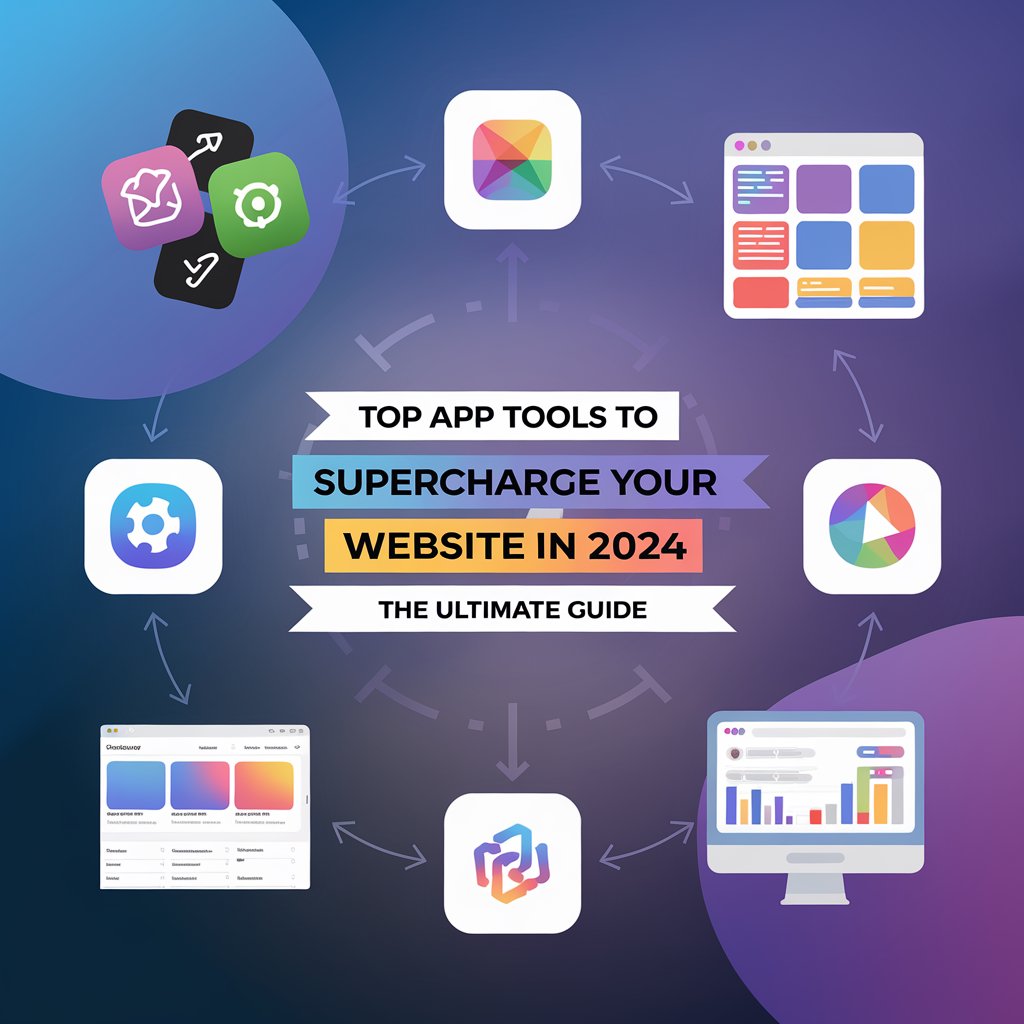
In today’s digital landscape, building and optimizing a successful website requires more than just great content or a sleek design. You need the right app tools to help you improve functionality, drive traffic, enhance user experience, and boost search engine optimization (SEO). Whether you’re running an e-commerce store, a blog, or a corporate site, integrating these powerful tools can significantly impact your website’s performance and success.
This guide will dive into the best app tools for websites in 2024, helping you choose the right solutions to grow your online presence.
1. Website Builders and CMS Platforms
If you’re just starting, the first tool you need is a solid website builder or content management system (CMS). These platforms make it easy to create, manage, and update your website without requiring coding knowledge.
Popular Website Builders and CMS Tools:
- WordPress: The most popular CMS platform, powering over 40% of all websites. WordPress offers flexibility with thousands of themes and plugins that let you customize your site.
- Wix: A drag-and-drop website builder that’s perfect for beginners and small businesses. Wix offers various design templates and built-in tools for SEO.
- Squarespace: Known for its elegant templates, Squarespace is great for creatives and small businesses looking to build visually appealing websites.
- Shopify: Best for e-commerce businesses, Shopify allows you to create online stores with easy-to-use features and app integrations for payments, shipping, and product management.
SEO Tip: “Best website builders for SEO” and “WordPress vs Wix for SEO” are highly competitive search terms that attract users looking for beginner-friendly platforms with built-in SEO capabilities.
2. SEO Optimization Tools
Optimizing your website for search engines is critical for driving organic traffic. Using the right SEO tools helps you perform keyword research, analyze website performance, and make data-driven decisions to improve your ranking on search engines like Google.
Top SEO Tools for Websites:
- Yoast SEO: A must-have plugin for WordPress users. Yoast SEO helps you optimize your content, manage meta descriptions, and improve readability.
- SEMrush: A comprehensive SEO suite that offers keyword research, backlink analysis, and site audits. It’s perfect for improving on-page and off-page SEO.
- Ahrefs: Known for its powerful backlink analysis, Ahrefs also offers a variety of SEO tools, including keyword tracking, content analysis, and competitor research.
- Google Search Console: A free tool from Google that helps you monitor your site’s performance on the search engine. It allows you to track search traffic, fix crawling issues, and submit sitemaps.
SEO Tip: “Best SEO tools for websites” and “how to improve website SEO with tools” are popular queries. Target these keywords in blog posts and guides to attract traffic from businesses and marketers.
3. Analytics Tools
To make informed decisions about your website’s performance, you need analytics tools that track user behavior, traffic sources, and conversion rates. Analytics apps help you understand what’s working and what’s not, so you can make adjustments accordingly.
Recommended Analytics Tools:
- Google Analytics: The industry standard for website analytics. Google Analytics offers deep insights into your website traffic, audience behavior, and conversion paths.
- Hotjar: Provides heatmaps and session recordings, showing you how users interact with your website. This is great for identifying problem areas and improving user experience (UX).
- Crazy Egg: Similar to Hotjar, Crazy Egg offers visual reports on user clicks, scrolls, and interactions, helping you optimize your site’s layout and design.
- Mixpanel: A tool for tracking specific user actions and funnels, perfect for understanding user engagement and improving conversion rates on websites and apps.
SEO Tip: Analytics-related keywords, such as “best website analytics tools” or “how to use Google Analytics for SEO,” are often searched by marketers looking to enhance their data-driven marketing strategies.
4. Website Speed Optimization Tools
Page speed is a critical factor in both user experience and SEO. If your website is slow, visitors are likely to leave, which can increase your bounce rate and hurt your rankings. Fortunately, there are several tools designed to help you optimize your website’s loading time.
Essential Website Speed Tools:
- Google PageSpeed Insights: A free tool that analyzes your website’s speed and provides recommendations for improving both mobile and desktop performance.
- GTmetrix: Offers detailed reports on your site’s loading speed and provides actionable suggestions to improve it.
- Pingdom: A popular tool that tracks your website’s performance and provides historical data to help you monitor speed over time.
- Cloudflare: A content delivery network (CDN) that speeds up your website by caching your content and distributing it across multiple servers worldwide.
SEO Tip: “How to improve website speed” and “best tools for website speed optimization” are excellent long-tail keywords to focus on if you want to target users who are looking to improve their site performance.
5. Security Tools
Website security is a top priority, especially for businesses that handle sensitive customer data or e-commerce transactions. By using security tools, you can protect your site from threats like hacking, malware, and data breaches.
Top Website Security Tools:
- Sucuri: Offers complete website protection with malware scanning, DDoS attack prevention, and security audits.
- Wordfence: A security plugin for WordPress that provides firewall protection, malware scanning, and login security features.
- SSL Certificates: Tools like Let’s Encrypt and Comodo provide SSL certificates, which are essential for encrypting data and securing your website.
- SiteLock: Monitors your website for malware, vulnerabilities, and security risks, helping you protect your site from cyber threats.
SEO Tip: Keywords such as “best website security tools” and “how to secure your website from hackers” rank well for users seeking information on safeguarding their sites.
6. Conversion Rate Optimization (CRO) Tools
Once you have visitors coming to your website, you want to convert them into customers, subscribers, or leads. Conversion rate optimization (CRO) tools help you analyze user behavior and implement changes that increase the chances of visitors taking desired actions.
Best CRO Tools:
- Optimizely: A leading tool for A/B testing, allowing you to experiment with different versions of your website to see which performs better.
- Unbounce: Specializes in landing page creation and testing, helping you design high-converting pages without needing a developer.
- Crazy Egg: With its heatmaps and scroll maps, Crazy Egg lets you see how users interact with your website, so you can make data-backed decisions for improving conversions.
- HubSpot: Offers a suite of marketing and sales tools, including features for A/B testing, personalized content, and lead generation.
SEO Tip: “Best CRO tools for websites” and “how to improve website conversion rate” are popular among marketers looking to increase their site’s profitability.
7. Email Marketing Tools
Building and maintaining a mailing list is crucial for nurturing leads and driving repeat traffic to your website. Email marketing tools help you send personalized messages, automate campaigns, and track performance to optimize your email outreach.
Recommended Email Marketing Tools:
- Mailchimp: One of the most popular email marketing platforms, offering easy-to-use templates, automation, and analytics.
- ConvertKit: Built with creators in mind, ConvertKit is perfect for bloggers, artists, and online businesses looking to engage their audience with email marketing.
- ActiveCampaign: A powerful platform for automating email marketing and creating personalized customer journeys.
- AWeber: A beginner-friendly tool for building email campaigns, creating sign-up forms, and tracking your email marketing results.
SEO Tip: Keywords like “best email marketing tools” and “email marketing tools for small businesses” attract businesses and marketers who want to grow their audience and improve engagement through email campaigns.
8. E-Commerce Tools
If you’re running an e-commerce website, you need the right tools to manage your store efficiently, track sales, handle payments, and provide excellent customer service. E-commerce tools help you streamline these processes while also driving conversions and sales.
Top E-Commerce Tools:
- Shopify: An all-in-one e-commerce platform that lets you manage your store, products, payments, and customers with ease.
- WooCommerce: A WordPress plugin that transforms your site into an e-commerce store, offering customizable features and seamless integration.
- BigCommerce: A scalable platform for large online stores, offering a wide range of features, including SEO tools, payment gateways, and product management.
- Klaviyo: An email marketing and automation tool built specifically for e-commerce businesses, helping you engage customers and boost sales.
SEO Tip: “Best e-commerce tools” and “how to set up an e-commerce store” are highly searched topics by entrepreneurs looking to break into the online retail space.
9. Social Media Integration Tools
Your website should work hand-in-hand with your social media presence to drive traffic and build brand awareness. Social media integration tools allow you to easily share content, track engagement, and schedule posts across various platforms.
Top Social Media Tools:
- Hootsuite: A popular social media management tool that allows you to schedule and monitor posts across multiple platforms.
- Buffer: Simplifies social media scheduling, letting you plan content for Facebook, Instagram, Twitter, and more from one dashboard.
- Social Snap: A WordPress plugin that adds social sharing buttons to your website, making it easier for visitors to share your content.
- Later: Best for visual content, Later is ideal for scheduling Instagram posts and stories, offering an intuitive drag-and-drop calendar.
SEO Tip: “Best social media tools for websites” and “how to integrate social media with your website” rank highly with users looking to boost their social presence alongside their website.
Conclusion
Choosing the right app tools for your website can significantly improve your site’s functionality, user experience, and overall success. From SEO optimization to analytics and security, these tools cover every aspect of running a website in 2024. By integrating these solutions, you’ll not only enhance your site’s performance but also ensure it’s fully optimized for search engines and user engagement.
For website owners and digital marketers looking to stay competitive, leveraging these tools will provide a strong foundation for success in the ever-evolving online landscape.










